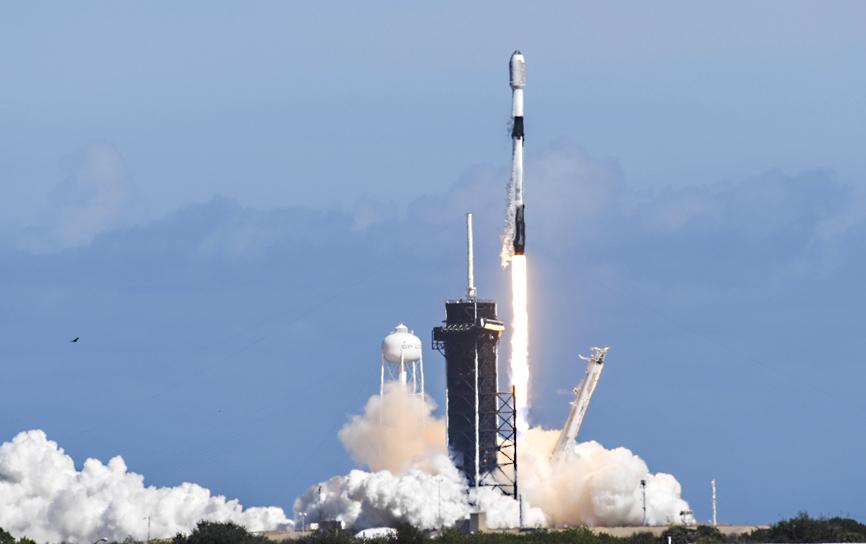Houston, we have a problem.
US rocket companies are facing the daunting task of ferrying hundreds of satellites to space in the coming years as sanctions sideline the Russian space launch industry.
SpaceX, Astra Space and Rocket Lab USA are among a handful of US companies expected to fill the vacuum, but industry officials have doubts about their capacity to quickly ramp up.

Photo: AP
As the race between companies, including Elon Musk-owned SpaceX’s Starlink and Amazon.com Inc’s Project Kuiper, for building giant satellite constellations to beam broadband Internet from space heats up, demand for launches is expected to skyrocket.
More than 800 satellites under 100kg are expected to be put in orbit this year alone, nearly double the number of launches last year, according to data from launch service aggregator Precious Payload.
With Project Kuiper taking up significant capacity over the next few years, analysts expect the industry to face some launch-related delays.
“Come 2024, 2025, when all these mega constellations need a launch, there is going to be a real problem,” Rocket Lab CEO Peter Beck told reporters, referring to the networks of communications satellites being built by SpaceX, AST Spacemobile and OneWeb.
Rocket Lab is among a new breed of firms building miniaturized propulsion systems to cash in on an exponential rise in demand for putting compact satellites in low-Earth orbit.
Last year, satellites launched by OneWeb and SpaceX accounted for the launch of about three-quarters of small satellites, industry analytics firm BryceTech said.
Still, Russia maintained a 16 percent share of the global launch market over the past five years, historical databases show.
Its share was actually larger, given that Soyuz rockets were also launched under a since-suspended French-Russian joint venture named Starsem.
About two-thirds of Soyuz launches were commercial or in support of the International Space Station, while the rest were for Russia’s domestic customers, Quilty Analytics analyst Caleb Henry said.
If access to Russia’s capabilities are lost due to Western sanctions on the country for its invasion of Ukraine, companies in Europe and the US would have to quickly step in to meet demand.
However, that might not be all that easy, given the complexities and challenges involved in building and launching new rockets.
“It is always possible that new vehicles will come online faster, thanks to improved manufacturing techniques, but precedent suggests it will be difficult to achieve high launch cadences for the next few years,” Henry said.
Beck said the launch crisis would also apply to smaller satellites used to image the Earth and conduct scientific observation that usually share a ride to orbit on a rocket with other satellites.
Delayed launches can affect satellite Internet companies in multiple ways. There is a risk of losing launch rights if they do not adhere to a US Federal Communications Commission-mandated deadline, while some firms might not see return on investment unless their satellite is in orbit.
United Launch Alliance, a joint venture between Boeing Co and Lockheed Martin, is set to replace its Russian engines with those made by Jeff Bezos-backed Blue Origin.
Still, Western launch companies have a long way to go.

Four people jailed in the landmark Hong Kong national security trial of "47 democrats" accused of conspiracy to commit subversion were freed today after more than four years behind bars, the second group to be released in a month. Among those freed was long-time political and LGBTQ activist Jimmy Sham (岑子杰), who also led one of Hong Kong’s largest pro-democracy groups, the Civil Human Rights Front, which disbanded in 2021. "Let me spend some time with my family," Sham said after arriving at his home in the Kowloon district of Jordan. "I don’t know how to plan ahead because, to me, it feels

The collapse of the Swiss Birch glacier serves as a chilling warning of the escalating dangers faced by communities worldwide living under the shadow of fragile ice, particularly in Asia, experts said. Footage of the collapse on Wednesday showed a huge cloud of ice and rubble hurtling down the mountainside into the hamlet of Blatten. Swiss Development Cooperation disaster risk reduction adviser Ali Neumann said that while the role of climate change in the case of Blatten “still needs to be investigated,” the wider impacts were clear on the cryosphere — the part of the world covered by frozen water. “Climate change and

Poland is set to hold a presidential runoff election today between two candidates offering starkly different visions for the country’s future. The winner would succeed Polish President Andrzej Duda, a conservative who is finishing his second and final term. The outcome would determine whether Poland embraces a nationalist populist trajectory or pivots more fully toward liberal, pro-European policies. An exit poll by Ipsos would be released when polls close today at 9pm local time, with a margin of error of plus or minus 2 percentage points. Final results are expected tomorrow. Whoever wins can be expected to either help or hinder the

DENIAL: Musk said that the ‘New York Times was lying their ass off,’ after it reported he used so much drugs that he developed bladder problems Elon Musk on Saturday denied a report that he used ketamine and other drugs extensively last year on the US presidential campaign trail. The New York Times on Friday reported that the billionaire adviser to US President Donald Trump used so much ketamine, a powerful anesthetic, that he developed bladder problems. The newspaper said the world’s richest person also took ecstasy and mushrooms, and traveled with a pill box last year, adding that it was not known whether Musk also took drugs while heading the so-called US Department of Government Efficiency (DOGE) after Trump took power in January. In a